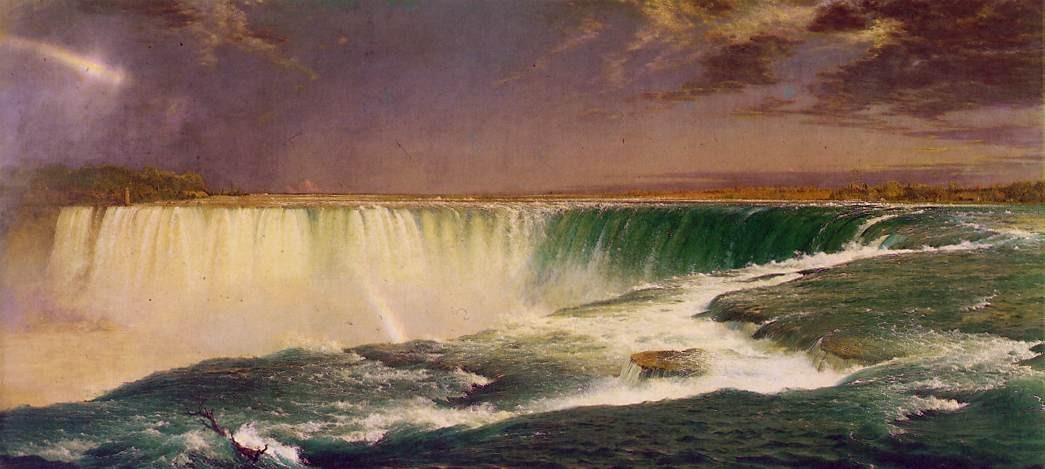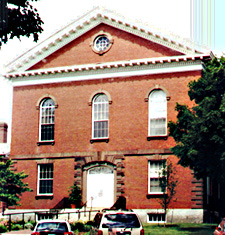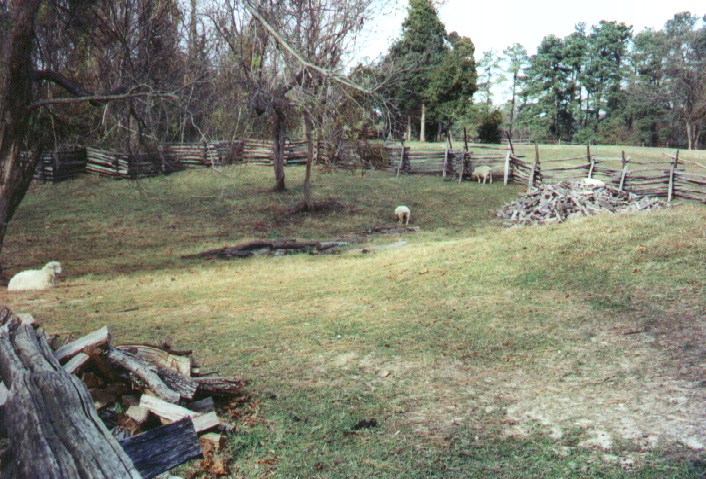Pastoral Meadow , Williamsburg, Va.
"His intercourse with heaven and earth, becomes part of his daily food. In the presence of nature, a wild delight runs through the man, in spite of real sorrows. Nature says, -- he is my creature, and maugre all his impertinent griefs, he shall be glad with me."
"Nature," 1836. Ralph Waldo Emerson

"Man is a stream whose source is hidden."
When we speak of nature in this manner, we have a distinct but most poetical sense in the mind. We mean the integrity of impression made by manifold natural objects. It is this which distinguishes the stick of timber of the wood-cutter, from the tree of the poet. The charming landscape which I saw this morning, is indubitably made up of some twenty or thirty farms. Miller owns this field, Locke that, and Manning the woodland beyond. But none of them owns the landscape. There is a property in the horizon which no man has but he whose eye can integrate all the parts, that is, the poet. This is the best part of these men's farms, yet to this their warranty-deeds give no title.
Ralph Waldo Emerson, Nature, 1836
Central to the beliefs of Emerson and his circle was of the belief that natural world symbolizes spiritual truth because it reflects a moral order of the over soul of which we are all a part.
The significance of nature is transcendent in that there is --beyond the material as Plato alluded to-- a metaphysical presence that infuses all nature with spiritual values.
"I believe that there is a subtle magnetism in nature."
"I wish to speak a word for Nature, for the absolute freedom and wildness as contrasted with a freedom and culture, merely civil,--to regard man as an inhabitant, or a part an parcel of nature, rather than a member of society."
Henry David Thoreau, 1851.
![]()
Nature,
To speak truly, few adult persons can see nature. Most persons do not see the sun. At least they have a very superficial seeing. The sun illuminates only the eye of the man, but shines into the eye and the heart of the child. The lover of nature is he whose inward and outward senses are still truly adjusted to each other; who has retained the spirit of infancy even into the era of manhood. His intercourse with heaven and earth, becomes part of his daily food. In the presence of nature, a wild delight runs through the man, in spite of real sorrows. Nature says, -- he is my creature, and maugre all his impertinent griefs, he shall be glad with me. Not the sun or the summer alone, but every hour and season yields its tribute of delight; for every hour and change corresponds to and authorizes a different state of the mind, from breathless noon to grimmest midnight. Nature is a setting that fits equally well a comic or a mourning piece. In good health, the air is a cordial of incredible virtue. Crossing a bare common, in snow puddles, at twilight, under a clouded sky, without having in my thoughts any occurrence of special good fortune, I have enjoyed a perfect exhilaration. I am glad to the brink of fear. In the woods too, a man casts off his years, as the snake his slough , and at what period soever of life, is always a child. In the woods, is perpetual youth. Within these plantations of God, a decorum and sanctity reign, a perennial festival is dressed, and the guest sees not how he should tire of them in a thousand years. In the woods, we return to reason and faith. There I feel that nothing can befall me in life, -- no disgrace, no calamity, (leaving me my eyes,) which nature cannot repair. Standing on the bare ground, -- my head bathed by the blithe air, and uplifted into infinite space, -- all mean egotism vanishes. I become a transparent eye-ball; I am nothing; I see all; the currents of the Universal Being circulate through me; I am part or particle of God.
Ralph Waldo Emerson, Nature, 1836
 "Walking" An Address to the Concord Lyceum, 1851.
"Walking" An Address to the Concord Lyceum, 1851.
"At present in, in this country, the best part of the land is not private property, the landscape is not owned
"In wildness is the preservation of the world."
"an inhabitant, or a part an parcel of nature, rather than a member of society."
Henry David Thoreau, 1851.
Fifty years of rapid growth.
- 1819 Financial Panic, caused by land speculation and weak banking regulations.
- 1820 Population: 9,638,453 people resided in the U.S.
- 1820 Missouri Compromise and the spread of slavery across the Mississippi River.
- 1828 first federal forestry reservation on Santa Rosa Island, Florida Panhandle.
- 1832 George Catlin proposes a national park for wild men and wild beasts.
- Indian Removal Act forcibly resettled the five tribes to Oklahoma from the SE.
- 1837 Financial Panic, land sales and defaulted loans cause economic collapse.
- 1846-1848 -- The war with Mexico over the Texas boundary.
- 1846 Preemption Act -- squatter's rights, to claim western land--the pioneers' advantage.
- 1849 The Department of Interior created by Congress.
- 1851 Thoreau's address to the Concord Lyceum, "Walking."
- 1853 William Cullen Bryant's influence in Central Park's creation in New York City.
- 1858 Mount Vernon purchased as an historical site.
- 1859 Financial panic caused an economic depression.
- 1863 Frederick Law Olmsted manages the Mariposa site (Yosemite) in California.
- 1864 By Act of Congress Yosemite Valley was granted to California as a park
- 1864 George Perkins Marsh published Man and Nature.
- 1865 Frederick Law Olmsted's The Value and Care of Parks.
- 1869 John Wesley Powell Descends the Colorado River through the Grand Canyon.
- 1870 Population: 39,818,449 people resided in the U.S.
Transcendent, transcendentalism means the ideal that new world Protestantism in the form of Unitarianism should seek a personal peace, or inner light as opposed to external signs of salvation. Emerson as an example of this transition left the Congregational sect of Protestant faiths to become a champion of independent thinking based on an understanding of nature as God's voice expressed in material symbols.
Mexican War fought over the expansion of slavery in the south west as Mexico had freed the slaves and Southern states wished to expand west of Texas.
public domain that land in western territories controlled by Congress and largely disposed of by the treasury and later the US land office and the Department of the Interior.
Geographical regeneration was advocated by George Perkins Marsh as a means to renourish the material or physical realities of nature that he felt sustained civilization.
What is Transcendentalism? -- Emerson, Thoreau, Margaret Fuller, and Theodore Parker.
"When I watch that that flowing river, which out of regions I see not, it pours for a season its streams into me, I see that I am a pensioner; not a cause but a surprised spectator of this ethereal water...."
Emerson. 1844.
- The chief source of Transcendentalist ideas was French philosopher Jean Jacques Rousseau & the German philosopher Immanuel Kant, especially from his Critique of Pure Reason (1781).
- In the United States, Transcendentalism became both a philosophy and a literary, religious, and social movement among Unitarians in New England and reached its peak during the 1840's.
- Ralph Waldo Emerson was the leading American Transcendentalist. He taught that the physical world is subsidiary to, and derivative of the spiritual world. For Emerson, the physical world serves humanity by providing commodity, beauty, language, and discipline.
"Everyman is a consumer and ought to be a producer. He fails to make his place good in the world unless he not only pays his debt but also adds something to the common wealth." Emerson quoted in Carolyn Merchant, Problems, p.179 .
- Emerson believed that people should learn as much as possible through observation and science. But he insisted that they should adjust their lives primarily to the truths seen through reason.
- All human beings find truth within themselves, and so emphasize self-reliance and individuality.
- Transcendentalists believed that society needs to be reformed. They argued that to learn what is right, a person must resist custom and social codes and rely on intuitive experience.
- Transcendentalists argued that the doctrines and organized churches of orthodox Christianity interfered with the personal relationship between people and God.
- The Transcendentalists said that individuals should reject the authority of Christianity and gain knowledge of their inner light through reason and a deeper appreciation for nature as sources of spiritual, mental, and physical renewal.
- Intuition was seen a healthy counter-force to an exclusive reliance on or excessive dependence on reason.
Preservation
Other reformers like Bryant, Ruffin, Powell, Olmsted, all those who had seen rapid changes in the landscape of entire watersheds shared a vision of how best to preserve America's natural heritage.
Frederick Law Olmsted realized that the preservation of the natural world's essential watershed and terrain that comprised scenery in the form of parks was an American innovation in keeping with the ideals of cultural nationalism. His landscaping of rural parks such as Yosemite Valley and urban parks in New York, Brooklyn, Boston, Buffalo, San Francisco, and Atlanta created an enduring national asset. treasure.
Laura D.Walls, biographer of Thoreau.
Critic of Wilson's narrow view of consilience.
Civil Disobedience by Henry David Thoreau, 1849.
Daily topics
10 Thoreau
11 Slavery
12 Pragmatism – Mumford on Pierce
13 Mumford — Urbanism & landscape
14 Reisner — Reclamation
15 Mid-term role play question: Would you flood the Grand Canyon?



